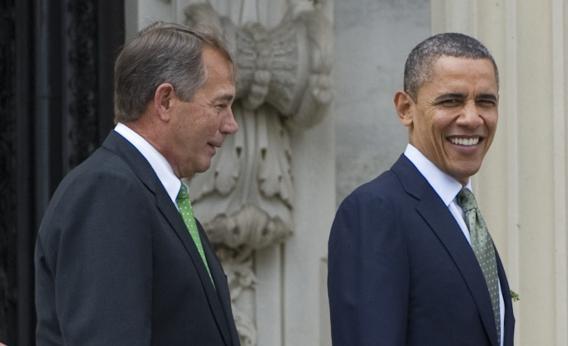Matt Bai has a pretty fantastic inside account of the Obama/Boehner talks on a grand bargain, but I think both sides may have always been further from an agreement than Bai thinks. The case that they were never really anywhere close to a deal goes like this: The Democratic position was always that there should be no entitlement cuts without tax hikes, and the Republican position was always that there should be no tax hikes. Obama and Boehner both personally wanted a deal, and in order to convince themselves that a deal was at hand kept talking around this point, but in reality neither of them ever budged on it even slightly.
I think the key passage in suggesting that no progress was ever really made is here:
In fact, when Boehner called back on that Thursday afternoon, the 14th, in hopes of restarting the negotiations, it wasn’t Obama but rather one of his chief aides who Boehner had decided was the problem. For weeks leading up to the breakdown in talks, Boehner and his top lieutenants—Barry Jackson, his chief of staff, and Brett Loper, his policy aide—had been talking principally to Jack Lew and Rob Nabors at the White House. But they had become exasperated with Lew, who, in their view, talked a lot but offered few concessions. Lew, whose detailed knowledge of the budget outpaced anyone else’s in the room, always seemed to have a better idea than whatever Boehner was proposing, and these ideas seemed to Boehner like more complicated ways of describing positions they had already rejected. The problem with Lew, Boehner bluntly told the president when he called, is that he just didn’t know how to get to “yes.”
Boehner thought he had a better shot with Bill Daley, the president’s chief of staff, and Timothy Geithner, the Treasury secretary. Daley had made a point of reaching out to Boehner since joining the administration, and he was known to be a pragmatist and a dealmaker. Geithner, clearly rattled by the possibility that Treasury might default on its debt, had been issuing almost daily warnings to Congressional leaders about the mounting fear in the markets. Send me Daley and Geithner, Boehner told the president, and let’s see what we can do.
The point here is that Boehner’s key tactic for restarting talks was to kick the White House’s budget analyst out of the room and deal with a compromise-minded political fixer instead. Why is that important? Well because here was Boehner’s proposal to get $800 billion in new revenue:
Boehner would argue that some sizable chunk of that money—if not all of it—would come to the government as a result of economic growth spurred by new, lower tax rates, and from better compliance, since the new tax code would be less confusing. Thus, by this feat of actuarial magic, Boehner contended that raising revenue did not require raising taxes, and in fact would enable you to lower them. The math was debatable, certainly, but it was a central tenet of any deal Boehner would negotiate.
As Bai says the “math” of this proposal was both “debatable” and a “central tenet” of the Boehner proposal. Any time Lew, the math guy, was out of the room this could look like a promising approach. But if the math guy kept saying the central tenet of the proposal was founded on bad math, then actually no progress was being made. So for a time Boehner got the math guy out of the room and it looked like progress was getting made. But clearly the president of the United States isn’t going to agree to a budget deal without running it by his budget director and, indeed, it turned out that “the framework negotiated by Obama, Daley, and Geithner—and laid out in the Republicans’ offer sheet—unsettled the stomachs of some White House aides” one of whom I’m going to guess was Lew. As Bai tells it, as soon as the deal exited that room it immediately started deflating. In the end Obama “rejected Boehner’s entire premise that growth could be counted on to deliver some of the revenue.”
Which is just to say that I think this gap was never really closed. The speaker always wanted to do a deal that didn’t raise taxes and the White House always refused to do a deal that didn’t raise taxes. For a brief moment both sides created the appearance of an emerging consensus by cutting the budget math guy out of the loop, but there was no actual closing of the gap.
